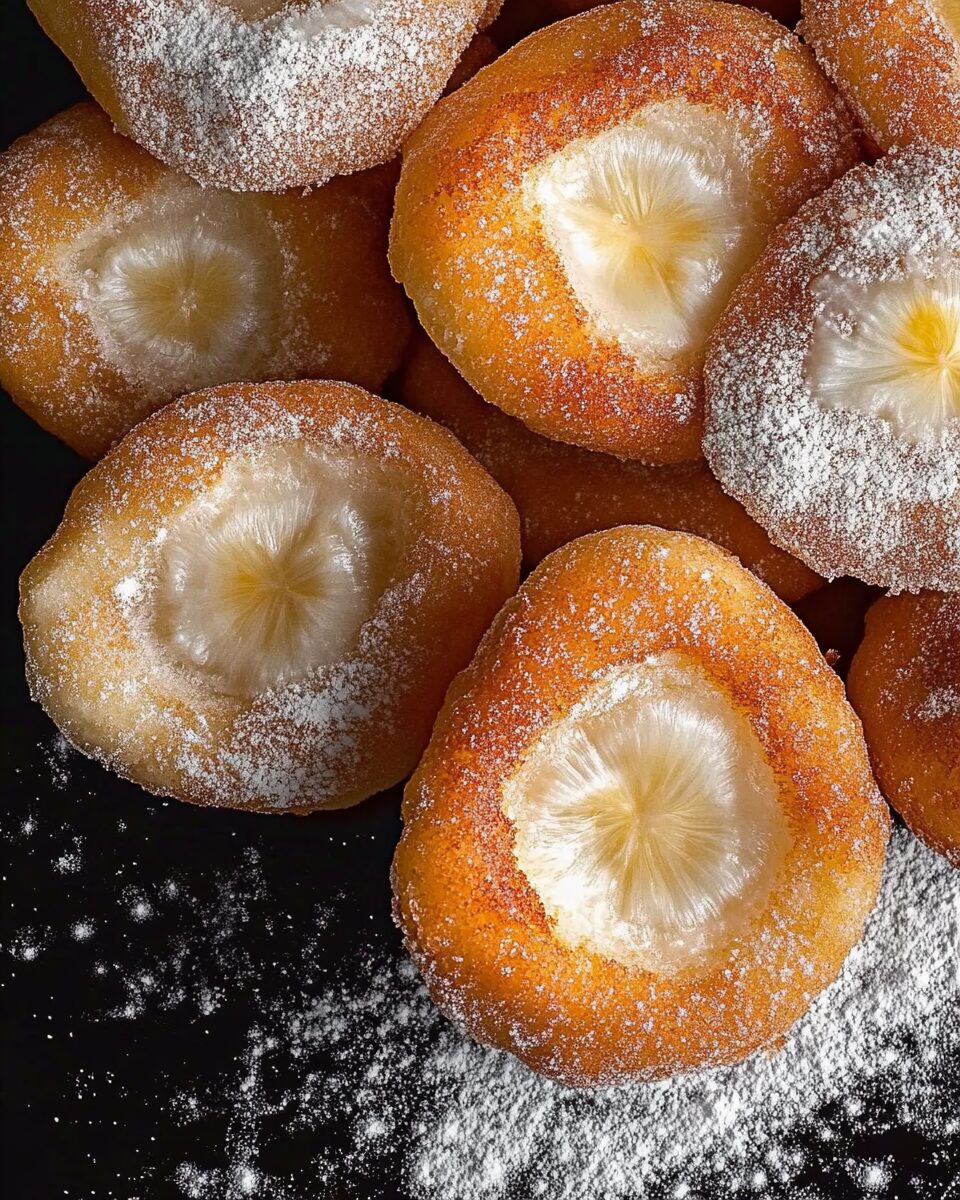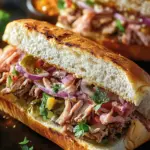These vegan malasadas are a plant-based twist on the classic Portuguese treat. Fluffy, deep-fried dough coated in sugar—what’s not to love? Perfect for celebrations, sweet cravings, or as a show-stopping dessert.
Full Recipe:
Ingredients
-
¾ cup warm plant-based milk
-
1 tbsp sugar
-
2¼ tsp active dry yeast
-
3 tbsp aquafaba
-
2 tbsp vegetable oil
-
1 tsp vanilla extract
-
¼ tsp salt
-
2 cups all-purpose flour (plus more for dusting)
-
Oil for frying
-
½ cup sugar (for coating)
Directions
-
In a bowl, combine warm milk and sugar. Sprinkle yeast over top and let sit 5–10 minutes until foamy.
-
In another bowl, whisk aquafaba until light and frothy.
-
Add aquafaba, oil, vanilla, and salt to the yeast mixture.
-
Mix in flour gradually until a soft dough forms.
-
Turn dough onto floured surface and knead for about 5–8 minutes until smooth and elastic.
-
Place dough in an oiled bowl, cover, and let rise in a warm spot for 1 hour or until doubled in size.
-
Punch down dough and roll out to about ½-inch thickness.
-
Cut into 2½–3 inch squares or rounds.
-
Cover and let rise again for 30 minutes.
-
Heat oil in a pot to 350°F (175°C).
-
Fry malasadas in batches, 1–2 minutes per side or until golden brown.
-
Remove and place on paper towels to drain. Roll in sugar while still warm.
Nutrients
(Per serving, assuming recipe yields ~10 malasadas)
-
Calories: ~220 kcal
-
Carbohydrates: 30g
-
Fat: 10g
-
Saturated Fat: 1g
-
Protein: 3g
-
Sugar: 8g
-
Sodium: 100mg
-
Fiber: 1g
A Brief History of Malasadas
The word malasada comes from the Portuguese term meaning “under-cooked” or “poorly cooked,” which may sound like a culinary misstep but actually references the dough’s rich, soft interior. Traditionally, malasadas are made with eggs, milk, and sometimes even butter—ingredients that lend the pastry its tender crumb and rich flavor.
Malasadas found their way to Hawaii in the late 19th century when Portuguese laborers from Madeira and the Azores migrated to the islands. There, the doughnuts became a staple treat, especially on Malasada Day, the day before Ash Wednesday. It’s similar to Mardi Gras or Shrove Tuesday, where people indulge before the fasting season of Lent. As the world embraced veganism, many bakers and home cooks began reinventing this cherished sweet in a way that aligns with their values—without sacrificing taste or texture.
Why Vegan Malasadas Are a Game-Changer
One of the best parts about vegan malasadas is how shockingly close they are to the original in terms of flavor and texture. Thanks to clever plant-based swaps like aquafaba (chickpea brine), dairy-free milk, and neutral oils, these doughnuts still puff up perfectly and develop that golden crust when fried.
This recipe not only meets the standards of traditional malasadas but exceeds expectations with the added bonus of being suitable for a variety of diets. They’re egg-free, dairy-free, and completely vegan, making them inclusive and suitable for parties, potlucks, and family gatherings where dietary needs vary.
For people transitioning to a plant-based lifestyle, vegan malasadas offer reassurance that indulgence doesn’t need to be sacrificed. They’re a delightful reminder that comfort food can still be compassionate.
Cultural Fusion and Global Appeal
Vegan malasadas exemplify the beauty of cultural fusion. While rooted in Portuguese tradition, their presence in Hawaiian culture and adaptation by the global plant-based movement show how food evolves and travels.
Malasadas have also found their way onto menus in modern cafés and dessert trucks across the U.S., Canada, and beyond—often infused with unique flavors like matcha, passion fruit, coconut cream, or even filled with vegan custard and jam. These variations maintain the spirit of the original while exploring new frontiers.
This adaptability makes vegan malasadas a canvas for creativity. Home bakers and professional chefs alike enjoy putting their own spin on the classic treat while honoring its origins.
Perfect for Celebrations and Everyday Cravings
Malasadas have long been associated with celebration. In Hawaii, Malasada Day is a highlight for many families who line up at local bakeries to get their hands on these warm, sugary treats. Vegan malasadas continue that festive legacy, making them a perfect addition to birthdays, holidays, or cozy weekends at home.
They’re also fantastic for brunch spreads, dessert platters, or even just a fun weekend baking project. Their nostalgic flavor and satisfying texture make them universally appealing to kids and adults alike.
The process of making malasadas—from proofing the dough to frying each piece—is also a rewarding and sensory-rich experience. The aroma alone will have your kitchen feeling like a bustling bakery.
What Makes Vegan Doughnuts Unique
Vegan doughnuts have gained popularity not just for ethical reasons, but because they challenge bakers to explore ingredients in new and exciting ways. The use of aquafaba, in particular, is a culinary marvel. It mimics the binding and leavening properties of egg whites, contributing to the lightness and structure of the dough without any animal products.
Dairy-free milk alternatives like soy, almond, or oat milk bring in subtle flavors and textures, while oils like canola or sunflower replace butter with just as much richness and moisture. The result is a product that doesn’t feel like a “substitute” but rather its own delightful version of a classic.
Vegan malasadas are proof that plant-based baking isn’t about limitations—it’s about innovation.
The Joy of Homemade Vegan Baking
There’s something special about making malasadas from scratch, especially when they’re vegan. The recipe allows bakers to engage with every part of the process: activating the yeast, kneading the dough, watching it rise, and carefully frying to golden perfection.
Homemade vegan malasadas allow for customization—whether you prefer them plain, filled, glazed, or coated in cinnamon sugar. Each batch feels personal, hand-crafted, and more satisfying than a store-bought version.
In a world of fast food and instant gratification, recipes like this reconnect us to the joys of slow food: attention, care, and love poured into each bite.
Pairing and Serving Suggestions
While vegan malasadas are absolutely delightful on their own, they also pair wonderfully with various beverages and sides. A hot cup of coffee or a frothy oat milk latte makes the perfect companion. For a more indulgent experience, serve them alongside a scoop of vegan ice cream or dip them in melted dairy-free chocolate.
They also make a beautiful presentation when served on a platter with fresh berries, citrus slices, or edible flowers for a more upscale affair.
For those who love experimenting, consider adding fillings like raspberry jam, dairy-free custard, or lemon curd. A dusting of powdered sugar or a drizzle of maple glaze can take them to the next level.
Nutritional Benefits and Considerations
While vegan malasadas are definitely a treat, they come with some upsides compared to traditional doughnuts. For starters, eliminating eggs and dairy reduces the amount of saturated fat and cholesterol, making them a lighter option for many people.
Aquafaba is also rich in proteins and contains trace amounts of minerals. And while they’re still a fried food, the ingredients used in vegan malasadas tend to be more easily digestible and less inflammatory than those found in processed or commercially made doughnuts.
With mindful portion control, vegan malasadas can be enjoyed as part of a balanced, plant-based lifestyle.
Vegan Malasadas in the Broader Plant-Based Movement
The popularity of vegan malasadas mirrors a larger trend in the food world—where plant-based versions of traditional dishes are becoming mainstream. From vegan mac and cheese to dairy-free cheesecakes, there’s a growing appetite for comfort food that aligns with values of sustainability, compassion, and health.
What makes vegan malasadas especially exciting is their ability to preserve the cultural essence of a beloved dish while introducing it to new audiences. They offer a bridge between tradition and progress, reminding us that good food brings people together regardless of diet.
As plant-based baking continues to innovate, malasadas remain a timeless treat that everyone can enjoy.
Conclusion
Vegan malasadas are more than just a dessert—they’re a celebration of culture, creativity, and compassion. With their irresistible taste, fluffy interior, and golden crust, they capture everything we love about classic malasadas while making room for new values in the kitchen.






